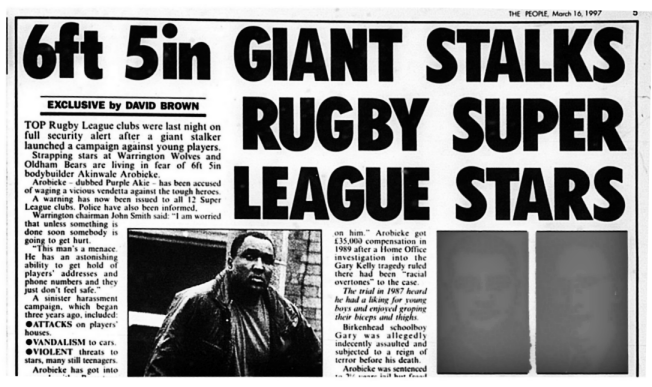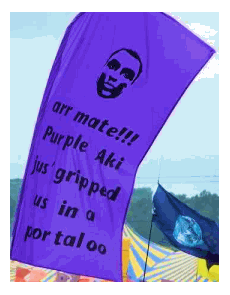In 1986, a 16 year old boy noticed that he was being followed. A giant of a man, six-foot-five and musclebound, seemed to appear wherever Gary Kelly went. He would wait outside Gary’s school, often confronting Gary to ask if he could touch his muscles. Gary knew who this man was — his reputation preceded him.
On 15th June 1986, Gary and his friends were escaping the relentless heat in New Brighton’s outdoor swimming pool. Once again, Gary had been followed. One of his friends, spotting the towering figure, informed the rest: “Aki’s Here!”.
Gary didn’t wait for his friends. He ran to New Brighton train station, but he sensed Aki wasn’t far behind. New Brighton is the end of the line, so Gary took the opportunity to hide in one of the stationary trains. It was at this point that, seemingly inevitably, he saw Aki looming ever closer.
Gary jumped down to the railway tracks whilst Aki watched from the platform. It isn’t exactly clear how it happened, but Gary touched the third rail and 750 volts coursed through his body. Despite efforts to revive him, Gary Kelly was pronounced dead when he reached the hospital.
The Bogeyman
Akinwale Arobieke was born on 15th July 1961 in the north of Manchester. However, it was by the name ‘Purple Aki’ that Arobieke became known. In the North-West of England and in nearby North Wales, Aki slowly gained notoriety and became somewhat of an urban legend as a result of his strange compulsion.
Even prior to the death of Gary Kelly, Aki had taken on near mythological status. Throughout the early to mid 1980s, Aki had often been seen stalking young rugby players and asking to touch their muscles. He asked them to pose for him and offered unsolicited exercise advice.

At first, this seemed funny; strange behaviour of a particularly eager fitness enthusiast. However, after several incidents where Aki gripped biceps and closely watched squats, Aki gained a reputation. Aki prayed on both teens and professional rugby players alike.
Manslaughter
Arobieke was found guilty of the involuntary manslaughter of Gary Kelly alongside indecent assault and harassment of 14 different boys. He was sentenced to 30 months in prison. The judge decided that Aki’s presence on the platform caused Kelly’s death.

In 1988, Aki appealed against his conviction. He argued that merely standing on the platform does not constitute a criminal offence. The judges agreed that the evidence did not show that Aki had physically threatened or chased Kelly. The Court of Appeal overturned the convictions, and so Aki was freed.
It was at that point that the tables turned — In 1989, Aki claimed that the prosecution’s case was racially charged, and he was subsequently awarded £35,000 in compensation.
The Legend
For those growing up in the Northwest of England in the 1990s, ‘Purple Aki’ became somewhat of an urban legend. Teenagers would share stories of a man who’d ask to feel your muscles, and on occasion, anecdotes of dubious encounters with Aki would be told like war stories. Aki was often seen travelling between northern train stations with his signature plastic bag in hand.

For many, the memory of Aki’s manslaughter charges soon faded. In the public conscience, Aki soon became little more than the butt of of an inside joke that the people of Liverpool, Manchester, and North Wales shared.
On occasion, Aki would resurface in local papers following various encounters with the law. In 2001, he was sentenced to 30 months behind bars for his continued and persistent harassment and intimidation.
It was clear, however, that Aki’s obsession was beyond control. In 2003, soon after being released from prison, Aki continued where he left off. He was charged with 15 further charges of harassment and witness intimidation and subsequently sentenced to 6 more years in prison.
Touching Ban
Having been released from prison on license in late 2006, Merseyside Police were all too aware that Aki’s compulsion was unlikely to have disappeared. Anticipating further recurrence of the strange behaviour he had become known for, they applied to the Court for a temporary Sexual Harm Prevention Order (SHPO). This was particularly unusual, as Aki had never been convicted of a sexual offence, but the Police felt this was their best chance of limiting his opportunities to satisfy his obsession.
The SHPO was granted, and Aki was banned from touching, feeling and measuring muscle, and asking strangers to perform squats for him. Aki was also prevented from waiting near schools and gyms, and was banned from entering Warrington, Widnes, and St. Helens (which are, notably, all towns with a strong rugby presence).
Aki lamented the severity of the ban and was initially successful in seeing it overturned. However, Merseyside Police quickly had it reinstated on appeal.
Less than 7 months after the order was effected, Aki commented on man’s biceps and touched them without permission. He was arrested for the breach of his SHPO and jailed for 15 months. The ban was also made permanent.
In June 2008, Aki once again sought to have the ban overturned. During the case, the police revealed further details of Aki’s behaviour. He was shown to keep a book of details relating to the victims of his harassment, including personal information such as addresses, phone numbers, information about their family members. It is clear that he was a calculated stalker. IT was also decided that Aki’s actions were indeed sexually motivated. A stark reminder that his behaviour was sinister as well as peculiar.
Bogeyman
Aki has often spoken out about his public reputation and the treatment he has often been subjected to. He takes offence to the name ‘Purple Aki’, it being an apparent reference to his dark complexion. In his 2008 attempt to overturn the touching ban, Aki acknowledged that he had come to be “infamous, notorious, everything from the bogeyman to whatever”.
Over the years, Aki faced harassment and prejudice on more than one occasion. In 2010, Aki was arrested and sentenced to two and a half years for touching a 16 year old boy’s muscles. The judge referred to him as a “sexual predator”, but Aki maintained that he had been set up.
“They receive several calls a day saying I am in locations across the country even when I am in prison.”
— Arobieke during his 2010 court appearance.
Aki’s comments proved to have some truth in them. In 2012, whilst he was still serving his prison sentence, Merseyside Police were forced to issue a statement denying that he had died, showing that the lines between “Purple Aki” as a character and Arobieke himself had become blurred.
Regardless of his motivations, Aki was clearly very interested in bodybuilding, and so it is no surprise that he could be seen attending a bodybuilding competition in Manchester in 2012. Aki was arrested due to a perceived breach of his bail conditions. An officer referred to him as a “famous paedophile” and used his arguably racist nickname.
“His real name is quite a lengthy Nigerian name. He’s very famous... He’s here accosting people in the toilets. As far as I know he’s got bail conditions that prevent him from attending this sort of event.”
—TDI Lewis, Police Operator.
Arobieke was held in police custody for six weeks until the case was dropped. He maintains that he was given no opportunity to defend himself and was effectively held as a result of his reputation.
Greater Manchester Police’s treatment of Aki on such occasions was later found to constitute misconduct.
Aki found himself in court once again in October 2015, as he had been charged with harassing a young man on a train from Manchester, in breach of his SHPO. Whilst Aki was found guilty of the breach, he maintained that he had again been falsely accused as a result of his reputation.
On this occasion, Aki noted that the prosecution and local newspapers often used the name “Purple Aki”, and that he found this to be racist and offensive. A complaint was lodged to the Press Complaints Commission and the newspaper agreed not to use the name again.

Vindication
Aki’s allegations of racism have been taken more seriously in recent years.
A BBC documentary in 2016 referred to Aki as a “big black man” several times. Whilst this may be seen as a mere physical description, it is clear that the phrase holds stereotypical and negative connotations. The BBC was subsequently investigated in relation to racial hate crimes.
The SHPO, or touching ban, was finally lifted in April 2016. The judge stated that the ban could “no longer be justified”, and that the victims of his most recent ‘touching’, did not feel that his actions were sexually motivated. Aki provided insight into the impact the order (and more generally his reputation) had on his life, and proved to be surprisingly self aware.
“From today I’m going to conduct myself properly… I’m not going to run around touching everybody’s muscles because there’s no need for that.”
“I want to bring my profile down. I don’t think the issue is me as a person, I think the issue is me as a profile.”
Psychologists determined that, despite earlier assertions, Aki’s obsession with touching muscles was not sexually motivated, and that he was more likely motivated by a need for human connection.
The judge stated he did not agree with the basis of the ban, and said “I’m not into bodybuilding myself, but I’d have thought men who have muscles in their arms the diameter of my leg are the sort of men who will admire each other’s bodies.”
In a surprisingly heartwarming exchange, both the judge and Arobieke acknowledged the years of stigma he had faced.
Judge Mansell said: “You are still carrying the stigma of the boy who died on the railway tracks. That ill hangs over you.”
Arobieke replied: “It’s not nice in any way, shape or form to be involved in the death of another human being.”
Lifting the SOPO, Judge Mansell said: “I’m giving you the clean slate you have desired for a long time. I’m also putting a considerable amount of trust in you to behave like a mature man in your fifties. You’re intelligent, I have seen that myself, i just hope you can make a lean break. For the first time in a long time you have no proceedings before the court.”
“I’m an honourable man”, Mr Arobieke said. “I won’t let you down.”
- Excerpt from a Liverpool Echo report on the hearing.
Protecting the Pariah
In 2017, a restaurant named one of their dishes “Purple Teriyaki”. The restaurant changed the name and apologised following complaints from the public that the name could be seen as racist.
If anything, these incidents suggest that Aki is no longer seen as a dangerous sex offender. Admittedly, the police are obligated to protect Aki as a member of the public. But as recently as 10 years ago, it would have been almost inconceivable that the public would jump to his defence.
It may be that attitudes towards habitual offenders has softened, or that casual racism has become less tolerated. But I believe there is more to it than that.

The legend of “Purple Aki” has been present in the collective consciousness of the North of England for a number of decades. Children, now adults, have grown up with stories about Aki, and warnings that “Purple Aki will come and get you.”
Pariah or not, Aki is ingrained in the culture of the Northwest.
But these days, Aki seems to be recognised as someone who has been failed by the justice system, taken advantage of by the press, and subject to prejudice and mockery. It could be argued that many of Aki’s offences could have been prevented by therapy and education.
“If I’m towering over them, and I am a big black man, they may not be really consenting, they may be consenting out of fear.
- Arobieke in his 2008 hearing.
A few years ago, I was travelling between Leeds and Liverpool by train. Whilst waiting for my connecting train at a Manchester train station, I saw a towering figure out of the corner of my eye. Aki, unmistakably. I couldn’t believe the size of him, and each time I looked, he caught me staring.
When I boarded the train, Aki boarded too. We shared glances, and he moved along the train closer to where I was. Let me be clear, Aki wasn’t being intimidating, and he certainly wasn’t interested in my (lack of) muscles, I imagine he was simply reacting to being stared at.
My train eventually pulled in to Lime Street train station and I sat on a bench to wait for my taxi to come. Looking down at my phone, the departing crowd filtered past me. The station was busy, but where I sat, I was certainly not at risk of obstructing anyone. Despite this, I felt a sudden jolt— someone had bumped into my knee, and it had to have been deliberate.
I looked up, and walking away with his plastic bag in hand, there was Aki.
